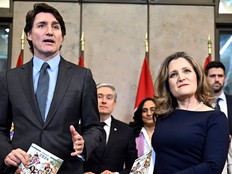Flaherty admits Greece could be forced from eurozone
Canada's finance minister says for the first time G20 leaders are working on a 'Plan B'
Article content
By Mark Kennedy
CANNES, France — Finance Minister Jim Flaherty says it’s “reasonably possible” that Greece will leave the eurozone, dropping the common currency, and that it’s necessary for world leaders to prepare a “Plan B” for that scenario.
Speaking to Bloomberg TV on Thursday, Flaherty sounded much less upbeat than his boss, Prime Minister Stephen Harper, who a day earlier had predicted that “cooler heads will prevail” in the crisis and that Greece would accept the recent bailout package it has been offered.
At the end of Thursday’s session, Harper acknowledged that leaders had discussions about a potential contingency related to a Greek departure from the 17-nation eurozone. But he went out of his way to pour cold water on the notion that scenario could actually occur.
Flaherty adopted a strikingly different approach Friday as he emerged briefly from morning meetings at the G20 summit.
In the Bloomberg TV interview, he was asked about contingency plans if Greece exits the euro.
“We have made the point, as others have made, that there needs to be a Plan B,” said Flaherty.
“Everyone has been operating on a Plan A — that is that Greece will stay in. They’ve decided that maybe they will, maybe they won’t. So we better have a Plan B. In fact, it is to protect other nations in Europe. That’s not on the table yet. Working on it.”
Flaherty responded bluntly when asked how he rated the likelihood of Greece having to leave the eurozone at this point.
“I think it’s reasonably possible,” he said.
“I mean, they have the ultimatum now from their partners in the eurozone that either you’re in or you’re out. You take the plan or you don’t. There’s no more negotiating. So that will be final decision by the Greek government of the day, whoever that happens to be.”
The G20 summit in this seaside resort has been overshadowed by the political drama unfolding in Athens, Greece, where Prime Minister George Papandreou announced a plan to hold an early December referendum on the recent bailout package — then seemed to back off from that Thursday.
At the G20 summit, French President Nicolas Sarkozy suggested the “peace” of Europe could hinge on whether the eurozone remains intact.
Despite the flip-flop by Papandreou, it is still far from certain that world leaders have averted an economic crisis in Europe that could become a global contagion.
Papandreou faces what’s expected to be an extremely close parliamentary confidence vote Friday.
The announcement of a referendum earlier this week by the Greek prime minister infuriated other European leaders — particularly Sarkozy and German Chancellor Angela Merkel — who felt betrayed.
As the summit began, European nations were warning that the price of a decision by Greeks to reject the bailout would be ejection from the eurozone — a development that experts suggested could have catastrophic economic consequences worldwide.
Still, Harper was upbeat in a news conference Thursday, saying that the “strong preference” of G20 leaders is to see progress made on the bailout package.
“This is obviously a decision the Greeks have to make,” he said. “As you know, things are moving fairly rapidly in Greece.
“I think there’s also a lot of evidence to suggest this is the way the Greek situation is moving.”
Harper acknowledged there has been some discussion about the “interesting contingency” of Greece leaving the eurozone and how that might rock the global economy.
“But my expectation is that cooler heads will prevail and the package will be accepted and we’ll move forward on that basis.”
As part of the deal negotiated Oct. 27, Europe would give Greece, which is deep in debt, another 130 billion euros to keep it afloat.
As well, private holders of Greek debts, such as banks, would be required to take a 50 per cent writedown on the debts they are owed. In return, Greece would have to proceed with austerity measures to get its debt under control — even though such steps have been met with fierce public opposition.
Sarkozy credited his own country and Germany for delivering a “message” to the “political class” in Greece about the importance of backing the deal.
Sarkozy spoke gravely about the dangers of any situation in which the eurozone becomes splintered by the departure of one of its members.
“The euro is the very heart of Europe,” said Sarkozy. “We cannot accept the explosion of the euro, which would mean the explosion of Europe.
“If the euro exploded, Europe would explode. And in fact, it’s the guarantee of peace on the continent where there were terrible wars — fiercer than anywhere else in the world — not in the 15th century but in the 20th century.”
The G20 leaders on Friday will wrap up their summit — the sixth gathering of global leaders since the 2008 recession — with a communique.
Flaherty said the countries will agree to “co-ordinated action” to promote economic development worldwide.
“I’m not sure how strong it will be. But there’s a will and a recognition that we need to have a form of co-ordinated action,” he said.
Canada is pushing for action in several areas:
A renewed commitment from all G20 partners to make good on their commitment from the 2010 summit to reach targets for deficit and debt reduction;
An agreement to implement financial-sector reforms that were agreed to at previous summits;
A commitment to resist protectionist trade measures; and
Action from some large countries with large trading surpluses, such as China, to adopt more flexible currency exchange rates.
On the latter point, it was revealed Friday morning that the G20’s final communique will contain a pledge.
“We affirm our commitment to move more rapidly toward market-determined exchange rate systems and enhance exchange-rate flexibility to reflect underlying fundamentals and refrain from competitive devaluation of currencies,” says the communique.
Specifically, the leaders say they “welcome” Russia’s recent changes to its foreign-exchange regime to allow its currency “to move more in line with market forces and China’s determination to increase exchange-rate flexibility consistent with underlying market fundamentals.”
Furthermore, the communique says that China will move to boost its own domestic economy with spending measures in areas such as a social-safety net and economic growth.
“These actions will be reinforced by ongoing measures to promote greater exchange-rate flexibility to better reflect underlying economic fundamentals, and gradually reduce the pace of accumulation of foreign reserves.”






Postmedia is committed to maintaining a lively but civil forum for discussion. Please keep comments relevant and respectful. Comments may take up to an hour to appear on the site. You will receive an email if there is a reply to your comment, an update to a thread you follow or if a user you follow comments. Visit our Community Guidelines for more information.